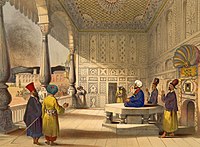Abdul Hai Habibi | |
|---|---|
| Native name | عبدالحی حبیبی |
| Born | 1910 Kandahar, Emirate of Afghanistan |
| Died | May 9, 1984 (aged 73–74) Kabul, Democratic Republic of Afghanistan |
| Occupation | Historian, politician, scholar, professor |
| Subject | History and academia |
| Website | |
| www | |
| History of Afghanistan |
|---|
 |
| Timeline |
Abdul-Hai Habibi (Pashto: عبدالحى حبيبي, Persian: عبدالحی حبیبی, romanized: Abd 'ul-Ḥay Ḥabībī) (1910 – 9 May 1984) was a prominent Afghan historian for much of his lifetime as well as a member of the National Assembly of Afghanistan (Afghan Parliament) during the reign of King Zahir Shah.[1] A Pashtun nationalist from Kakar tribe of Kandahar, Afghanistan, he began as a young teacher who made his way up to become a writer, scholar, politician and Dean of Faculty of Literature at Kabul University.[2][3] He is the author of over 100 books but is best known for editing Pata Khazana, an old Pashto language manuscript that he claimed to have discovered in 1944; but the academic community does not unanimously agree upon its genuineness.[4]
- ^ Reddy, L. R. (2002). Inside Afghanistan: end of the Taliban era?. APH Publishing. p. 73. ISBN 978-81-7648-319-3. Retrieved 30 September 2010.
- ^ Saikal, Amin (2006). Modern Afghanistan: a history of struggle and survival. I.B.Tauris. p. 110. ISBN 978-1-84511-316-2. Retrieved 30 September 2010.
- ^ "Lesmiserables, les Afghans". Dr Fazal-ur-Rahim Marwat. TheFrontier Post and RAWA. 4 September 1998. Retrieved 27 September 2010.
- ^ Lucia Serena Loi: Il tesoro nascosto degli Afghani. Il Cavaliere azzurro, Bologna 1987, p. 33